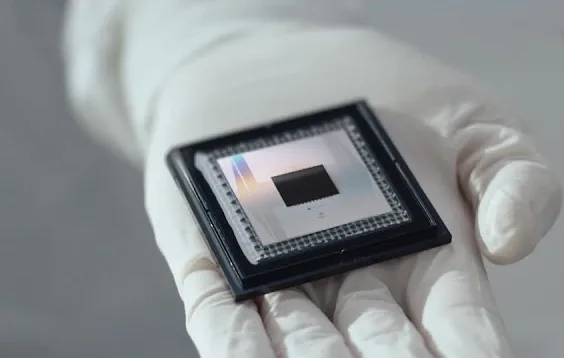The willow chip from Google revolutionises computing, completing tasks in minutes that would take traditional computers 10 septillion years
In a groundbreaking development, Google has unveiled its new quantum computing chip, Willow, which has the ability to perform tasks in just five minutes that would take traditional supercomputers a staggering 10 septillion years to complete. To put that into perspective, 10 septillion years is vastly longer than the current age of the universe, and its mind-boggling scale highlights the extraordinary speed of Willow, which measures just 4cm squared, roughly the size of an After Eight mint.
Developed in Santa Barbara, California, Willow marks a significant step forward in the field of quantum computing, a technology that harnesses the strange properties of quantum mechanics to perform calculations far beyond the reach of classical computers. While the technology has been in development for years, Willow’s performance is a testament to the rapid progress the field has made. Scientists are now predicting that within five years, quantum computing could be powerful enough to transform sectors ranging from pharmaceuticals to material science, with the potential to drastically speed up the development of new drugs.
The chip is a remarkable leap forward in quantum error correction, an issue that has plagued quantum computing for years. Previous quantum chips have been highly susceptible to errors due to their delicate nature, with even the slightest disruption—such as cosmic rays or material defects—knocking the system off course. Willow, however, is said to be far less prone to these errors, making it a significant improvement in both reliability and performance. This breakthrough is likely to boost the already rapid progress in artificial intelligence (AI) and could lead to faster advancements in fields such as medical imaging. For example, the technology could potentially allow MRI scans to be read with atomic-level precision, opening up new avenues for AI to process health data and improve diagnostics.
Quantum computing has the potential to revolutionise industries, enabling researchers to model complex systems that were previously beyond reach. In addition to its uses in medicine and drug development, quantum computing is expected to accelerate the creation of nuclear fusion reactors and hasten the progress of AI. The implications for AI, in particular, are profound, as quantum chips could dramatically enhance machine learning models and data analysis.
However, the technology comes with concerns. One significant risk is the potential for quantum computers to crack current encryption methods, rendering existing security systems obsolete. Despite these concerns, Google’s quantum computing division, Google Quantum AI, remains optimistic about the potential of quantum mechanics, with efforts already underway to develop “post-quantum encryption” standards that could secure sensitive data in a quantum computing future.
Hartmut Neven, the founder of Google Quantum AI, believes that quantum processors will continue to “vastly outperform” classical computers as the technology scales up, describing this progress as “cracking a key challenge in quantum error correction that the field has pursued for almost 30 years.” Neven added that Willow’s speed lends credibility to the idea that quantum computation occurs in parallel universes, a concept inspired by the multiverse theory. This idea stems from the fact that quantum computers can exist in multiple states simultaneously, allowing them to process information much faster than traditional computers.
Experts in the field, such as Dr Peter Leek from Oxford University’s Quantum Institute, agree that these results show the rapid advancement of quantum computing technology, but they caution that the full potential of these machines is still a few years away. Leek noted that while the current results are impressive, the real-world applications of quantum computing will take time to materialise.
Charina Chou, Chief Operating Officer of Google Quantum AI, addressed concerns regarding quantum computing’s impact on security. She assured that experts in the field have been working for years to establish the right standards for post-quantum encryption, and Google is collaborating with industry leaders and researchers to ensure that new technologies remain secure.
As the race for quantum computing dominance intensifies, Willow’s debut represents a critical moment in the evolution of this transformative technology, promising new possibilities for AI, healthcare, and beyond.
